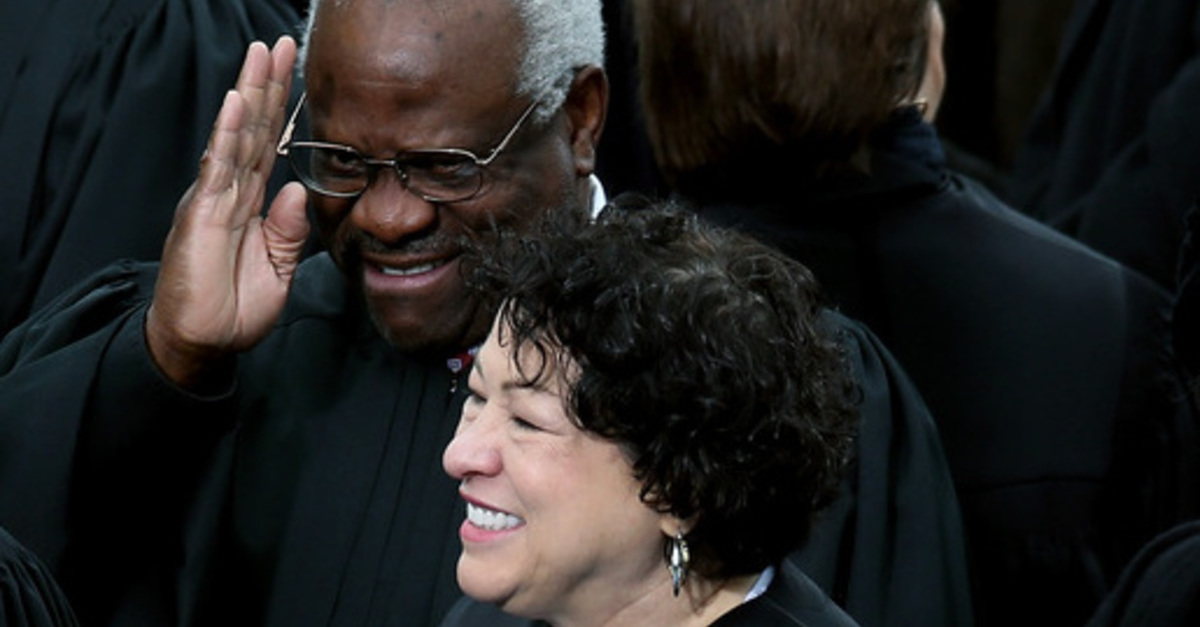
The U.S. Supreme Court handed down a 5-4 decision on Monday in a sentencing case, holding that the First Step Act signed into law by then-President Donald Trump in 2018 “allows district courts to consider intervening changes of law or fact in exercising their discretion to reduce a sentence.”
Justices Sonia Sotomayor penned the opinion of the court, which was unsurprisingly joined by her fellow justices on the high court’s left flank, Justice Stephen Breyer and Elena Kagan. Leading to an unusual lineup, Justices Clarence Thomas and Neil Gorsuch also joined the majority — against Justice Brett Kavanaugh, Chief Justice John Roberts, and Justices Amy Coney Barrett and Samuel Alito.
In May 2021, Carlos Concepcion asked SCOTUS to decide the following question:
Whether, when deciding if it should “impose a reduced sentence” on an individual under Section 404(b) of the First Step Act of 2018, 21 U.S.C. § 841 note, a district court must or may consider intervening legal and factual developments.
Concepcion, the petition for a writ of certiorari noted, is serving a 19-year federal prison sentence after pleading guilty in 2008 to “possession with intent to distribute, and distributing, at least five grams of crack cocaine.”
The petition said that Concepcion was sentenced in 2009 — “about one year before the Fair Sentencing Act of 2010 became law.” That law, the Supreme Court pointed out in the opening line of its syllabus on Monday, was passed by Congress to “correct the wide disparity between crack and powder cocaine sentencing.”
The majority opinion also noted that the First Step Act, which followed eight years after the Fair Sentencing Act, “authorizes district courts to reduce the prison sentences of defendants convicted of certain offenses involving crack cocaine.”
For Sotomayor and the majority, the answer to Concepcion’s question about whether those district courts may consider “intervening legal and factual developments” in such circumstances is yes. The majority found that the district court “erroneously” believed — and the U.S. Court of Appeals for the First Circuit erroneously affirmed — that there was no discretion to consider intervening developments.
“The question in this case is whether a district court adjudicating a motion under the First Step Act may consider other intervening changes of law (such as changes to the Sentencing Guidelines) or changes of fact (such as behavior in prison) in adjudicating a First Step Act motion,” Sotomayor wrote. “The Court holds that they may. It is only when Congress or the Constitution limits the scope of information that a district court may consider in deciding whether, and to what extent, to modify a sentence, that a district court’s discretion to consider information is restrained. Nothing in the First Step Act contains such a limitation.”
“Because district courts are always obligated to consider nonfrivolous arguments presented by the parties, the First Step Act requires district courts to consider intervening changes when parties raise them,” the justice explained. “By its terms, however, the First Step Act does not compel courts to exercise their discretion to reduce any sentence based on those arguments.”
The minority led by Justice Kavanaugh did not agree that there is textual support in the First Step Act for considering aforementioned “intervening legal and factual developments.”
“The Court today concludes that district courts in First Step Act sentence-modification proceedings may reduce sentences based not only on the changes to the crack-cocaine sentencing ranges, but also on other unrelated legal or factual changes that have occurred since the original sentencing,” Kavanaugh began. “I respectfully disagree. The text of the First Step Act authorizes district courts to reduce sentences based only on changes to the crack-cocaine sentencing ranges, not based on other unrelated changes that have occurred since the original sentencing.”
Justice Kavanaugh said that the majority had sidestepped the “text of the Act.”
“The Court sidesteps the text of the Act and equates sentence-modification proceedings with plenary sentencing proceedings. But as this Court has recognized, there are ‘fundamental differences between sentencing and sentence-modification proceedings,'” he added, before summing up later: “the First Step Act authorizes district courts to reduce a sentence based on changes to the crack-cocaine sentencing ranges, but not based on other unrelated legal or factual changes since the original sentencing.”
[Image via John Moore/Getty Images]
Have a tip we should know? [email protected]